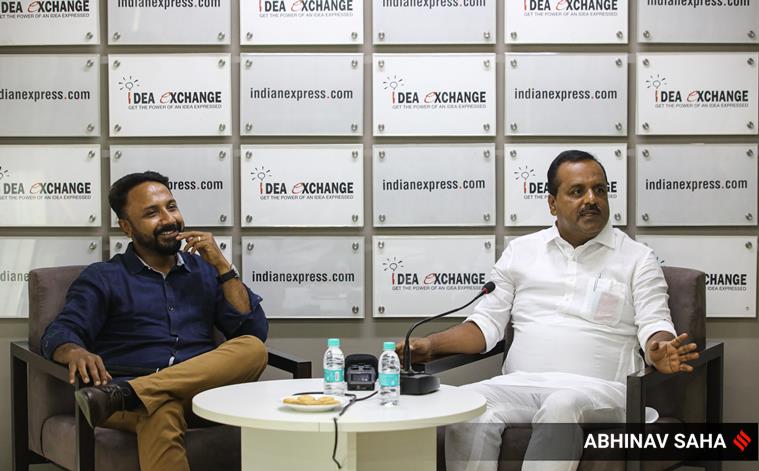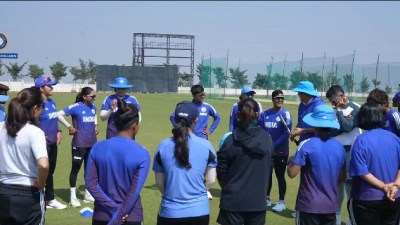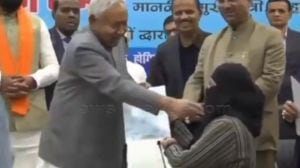‘If a law that is not good for people is passed, then Opposition should be allowed to protest’: Karnataka Assembly Speaker UT Khader at Idea Exchange
At 54, UT Khader is the second-youngest Speaker of the Karnataka Assembly. Khader, who began his political career as a National Student Union of India (NSUI) activist, is a five-term Congress MLA from Mangalore, having first won in a by-election after the death of his father, UT Fareed.
 "Ultimately, my vision is that it should be a peaceful and respectful Assembly," UT Khader said. (Express photo by Abhinav Saha)
"Ultimately, my vision is that it should be a peaceful and respectful Assembly," UT Khader said. (Express photo by Abhinav Saha) Karnataka Assembly Speaker UT Khader on what the Congress win in the state means, the role of the Speaker and why protests and discussions have their place in the Assembly. This session was moderated by Associate Editor Manoj CG.
Manoj CG: After 2019, the Congress has not won a single state, barring Himachal Pradesh and Karnataka. These two victories, especially the one in Karnataka, have come after a long electoral drought. Nationally, what is the message the Congress is trying to send?
The Karnataka victory is a victory of the Constitution and defeat of the communal forces. The BJP government, in the last five years, has divided the society. As a Speaker, I can’t say more. I’m neutral now, not a party member. I am a friend of the Opposition now, which will hold the government accountable.
Manoj CG: In coastal Karnataka, the BJP didn’t lose much. Out of the 19 seats, they had 16 the last time. This time the count was 13. In Udupi, they won all five seats. They have also won seats in Dakshina and Uttara Karnataka. In the area majorly influenced by that sort of politics, the BJP’s run did not end.
An election doesn’t have only one dimension. It is like an examination — to pass an examination, you have 5-6 subjects. If you get 100 marks in one subject and 20 marks in another, you will fail. The party that lost in the coastal areas will think about why it lost. I think they will see how to rectify it in the future.
 Karnataka Assembly Speaker UT Khader. (Express photo by Abhinav Saha)
Karnataka Assembly Speaker UT Khader. (Express photo by Abhinav Saha)
Manoj CG: In the past, we have seen the Speaker of the Karnataka Assembly emerge as a force and come into play because of various factors — defection, operation and protests. This time, the Congress has a comfortable majority, but do you apprehend that you will be asked to play any sort of role in terms of shifting or switching?
The Speaker’s role is not to speak, but to let others speak. As I discharge my duty according to the Constitution, no one can direct me. If anyone has a suggestion or any situation arises, I will do my duty as per the rules and procedures of the Parliament and the Constitution.

Manoj CG: You were a minister in the Siddaramaiah government and in the short-lived Kumaraswamy government. Are you disappointed that, at this young age, you were asked to become Speaker and not minister?
I’m really happy to be elected as the Speaker. Every opportunity in politics is a step for the future. When I was an MLA, I was committed to my work as an MLA. When I was a minister, I worked as one.
Bangalore needs good infrastructure. But infrastructure is a continuous process… We will see to it that the government is held accountable for Bangalore’s development, which will help the investors and the state
Vandita Mishra: I would like you to wear the former Congress minister hat. You belong to the coastal area of Karnataka and the BJP’s Hindutva charge has been successful this time. Some Congress minister was rebuked by the party for having suggested that the cow slaughter law will be reviewed, and also the hijab ban order. On these two things, what do you think the Congress government in Karnataka should do?
As the Speaker, I don’t know whether I can answer this. I don’t know what the party’s stand on these issues is. A government should run according to the Constitution and the law of this country. The public should also ensure that the Constitution and the law are upheld. That is the only thing that can keep India united and prosperous in the future.
 Karnataka Assembly Speaker UT Khader. (Express photo by Abhinav Saha)
Karnataka Assembly Speaker UT Khader. (Express photo by Abhinav Saha)
Vandita Mishra: Today, in India, wherever the BJP is in power, we find that there is a shrinking space for the Opposition in the legislatures. In Karnataka, the role is reversed; the Congress is in power and the BJP is in the Opposition. Are you going to do things while taking lessons from how the BJP is actually shrinking space for the Opposition in other states to make sure that you don’t do the same here to the BJP?
For me, the BJP is not the model. Mahatma Gandhi, BR Ambedkar and Jawaharlal Nehru are my models. I’m a friend of the Opposition but they might be suspicious of me. In rare cases, I will have to be with the government, with the ruling party because the House runs on majority. We’ll see to it that the rules and procedures of the democratic system and the Constitution are upheld.

Amitabh Sinha: The distrust for the presiding officers amongst the Opposition parties is not only in Karnataka, it’s even in the Parliament. As a presiding officer, what do you think needs to change in the way the Speaker or the presiding officers are selected? Can there be something which increases the trust? Also, as a presiding officer, how do you engage with the Opposition so that the conduct of the House is carried out in a more efficient manner than what we see currently?
Getting their trust depends on how I run the Assembly. I will try my best to put an end to dharnas and protests. There are better ways to convince the ruling party. Ultimately, my vision is that it should be a peaceful and respectful Assembly.
Amitabh Sinha: How do you discourage protests and how do you deal with slogan shouting?
It depends on the situation. I have decided to organise a four-day training camp for the MLAs at the Shantivana centre. For four days, they’ll be inside the campus of the naturopathy centre. We’ve got sessions that are focused more on practicals than theory. There are sessions on stress management and talks by motivational speakers like Sadhguru, BK Shivani of the Brahma Kumaris, and Gaur Gopal Das of ISKCON. That’s for their personal development. Every evening, the new MLAs can exchange views with the former Chief Ministers.
 Karnataka Assembly Speaker UT Khader. Abhinav Saha
Karnataka Assembly Speaker UT Khader. Abhinav Saha
Manoj CG: You had a meeting with the Lok Sabha speaker and the Vice President, who is also the Chairman of the Rajya Sabha. As presiding officers, what advice did they give you?
They asked me to see to it that all the rules and procedures are followed and a good atmosphere is maintained in the House. They asked me to change the situation with regard to the negativities that come automatically or traditionally.
The opportunity to protest should also be given to members because sometimes some governments just bulldoze and take the road with no discussion. Things that need to be discussed are passed without any discussion and what is not supposed to be discussed, it’ll be discussed for two to three hours. If any law, which is not for the good of the people is passed, then the Opposition should be given the opportunity to protest. Ultimately, any discussion or protest should benefit the society.
The Speaker’s role is not to speak, but to let others speak. As I discharge my duty, no one can direct me. If anyone has a suggestion or any situation arises, I will do my duty as per the rules of the Parliament and the Constitution
Story continues below this ad
Jatin Anand: There have been increasing instances of governors allegedly trying to get into legislative business and interfering with the Bills which are passed. How is your relationship with your governor? If there is an instance of interference, how do you plan to tackle that? Have you noticed that sort of interference in the past?
We respect the position and power of the governor. I haven’t come across any interference from the governor in administration or government activities. If anyone does it, it will be dealt with at that time. If it arises in some situation, then the government will act on that and will see that the law is maintained. But interferences have rarely occurred.
 Karnataka Assembly Speaker UT Khader in conversation with Associate Editor Manoj CG. (Express photo by Abhinav Saha)
Karnataka Assembly Speaker UT Khader in conversation with Associate Editor Manoj CG. (Express photo by Abhinav Saha)
Uma Vishnu: During the hijab protests, Dakshina Kannada was somehow largely unaffected. The protests spread across the state and had repercussions elsewhere . Why do you think that happened?
People of Dakshina Kannada knew what the real problem was. Everyone thought that the issue should be allowed to be amicably and peacefully resolved.
Amitabh Sinha: On delimitation, would you like to see the number of seats go up? There are complications at the Central level in the Parliament, but the number of seats in the States has been frozen for 50 years.
Demarcation takes place once in 30 years in the Assembly. In 2008, the demarcation was taken up for the Assembly. About the change in the number of seats, I don’t know because I’m not very thorough with this subject. Ultimately, delimitation is according to the Constitution.
Monojit Majumdar: In February, the Supreme Court issued a notice to the Centre, to five-six states because no deputy speaker had been appointed.
In Karnataka, every time any government is formed, a deputy speaker is appointed. The government is going to elect a deputy speaker in the first session of the Assembly. Regarding other states, I don’t know what the problem is.
Shalini Langer: How do you see the role of the Popular Front of India (PFI) in the hijab protests and politically too, considering that they didn’t win a single seat? Do you think they are played up too much in politics and given too much importance?
They are given too much importance. Strict action should be taken against any anti-social elements.
Shalini Langer: The BJP government has raised a lot of questions about dropping cases against the PFI.
That is only propaganda.
Aakash Joshi: Do you feel that Speakers are doing enough in the Parliament and in the Assembly especially with a single-party dominant government like you have? What should they be doing to tackle over-representation?
I’m very new to this position. My role is like that of a judge. While the advocates are arguing, the judge not only listens but also updates himself on the law. During the argument between the Opposition and the government, I have to learn something and have to be perfect. So I don’t know what the loopholes are in the Rajya Sabha and the Lok Sabha. When I will sit in the Chair, I will also update myself and learn and see to it that as far as possible, not to let these things happen. No one can change the system in one day.
Sanath Prasad: One of the poll promises from the Congress was that the National Education Policy (NEP) will be scrapped. But now there’s a lot of dilly-dallying around it. Why wasn’t this thought through when you added it to your poll manifesto?
Every policy has some pros and cons. This should be discussed thoroughly and whatever is not good for students should be changed. That should be the duty of any government. Passing the policy without discussion was a problem.
Sanath Prasad: These days officials are taking stock of the infrastructure in Bangalore. But how much of this will actually translate into action for a better and safe city?
Bangalore is a developed and a developing city where people from around the world come to invest. So the city needs good infrastructure. But infrastructure is not a one-time programme; it is a continuous process. I’m sure whatever the government plans are, they will be implemented at the earliest and we will see to it that the government will be held accountable for the development and interest of Bangalore, which will help not only the investors but also the entire state. The development of the state depends on tax collections from Bangalore. More than 50 per cent of the expenditure is done in other parts of the state. So it is economically better for the state to develop infrastructure so that investors would come and invest in Karnataka and in Bangalore.
Vidhatri Rao: In the Legislative Council, no party has a clear majority. The passing of bills, too, has to be done by the Legislative Council. How do you see the relationship between the Assembly and the council panning out in this context?
Now, there are a few seats less for the majority in the Council. The ruling party has got an absolute majority in the Assembly. In a few months, they’ll get five to eight seats in the Council too. Automatically, the ruling party will get the majority. A bill passed in the Assembly goes to the Council. If it doesn’t pass the second time, the Assembly can pass it directly. There’s no need for sending it to the Council. If they refer it to the committee, the bill will be held up in committee. It always doesn’t happen. Only once in a while. By next month, the ruling party will get eight seats.
Vandita Mishra: There is a crisis of debate in our legislatures. You mentioned a law that the Centre might be getting to penalise Opposition members. Do you think we need laws that monitor what the Opposition and government do because these are also times when majorities are weaponised. Is a law the best way or do you think the answer lies in the role of the Speaker, for instance?
Ultimately, it lies in the role of both the ruling party and the Opposition within the Assembly. A healthy debate is important. When the discussion is unparliamentary, when it breeds hatred, it runs counter to the business of the House. If there’s a healthy and peaceful debate, without any hatred, then the crisis can be mitigated. That is why we are making first-time young MLAs undergo training. I would like to see more and more youngsters speak.
Johnson TA: People who came to the House earlier were lawyers and social workers. But now more business people are being elected to the House.
During my father’s time, in the ’70s, politicians used to think of the society and development and maintained respect and dignity in the society. Business people did their business and during elections, if politicians needed help, they helped. When businessmen needed help from politicians, the politicians would help them. Much later, the businessmen thought, if they are helping the politicians, while the latter rules, why can’t they rule? The politician thought if he is helping the businessman while the latter makes money, why shouldn’t he make money instead? So politicians have become businessmen and vice-versa. So, now anyone can come to the House.
Jatin Anand: How do you view freebies such as the one pertaining to free travel for women and transgenders on public transport for a state like Karnataka and also in the larger context for the country?
People who have some money in their pocket will always question the need to give freebies. But for a family living on little money, this will be the biggest gift. Ultimately, the duty of the government is to see that those who are struggling for bread and butter should have a peaceful and dignified life. I would like to see these schemes in a positive light. The free 10 kg rice scheme is important. The government’s vision was that no one should work or study or sleep on an empty stomach. Only when we strengthen people can the country become better.
Vidhatri Rao: In a recent incident, an underpass in Bangalore was flooded and a woman passed away. Even if there’s a short spell of rain, the city comes to a standstill.
The discipline of the drivers is also important. For the benefit of infrastructure, you have to build an underpass. When it’s raining and the water is going down to the underpass, should I take my vehicle down? I’m not just talking about the Bangalore incident — that was tragic. But people should understand that nature is not in our hands. We can’t blame politicians, MLAs, officers and ministers for everything. Civic responsibility is also important.
- 01
- 02
- 03
- 04
- 05































